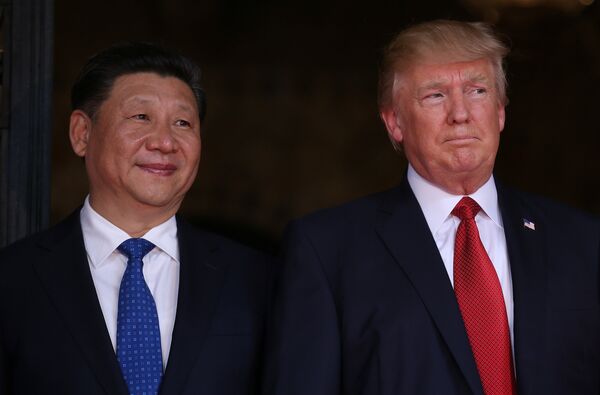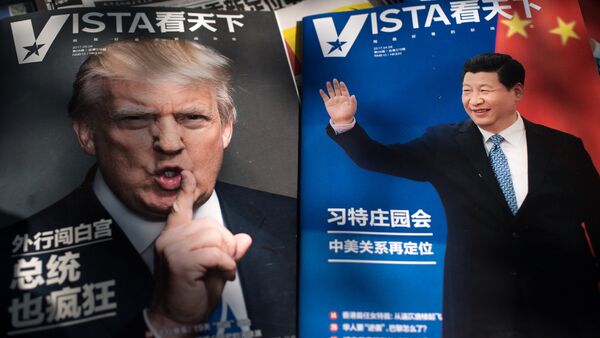Following Chinese President Xi Jinping's announcement at the 18 May WHO summit that the People's Republic would donate an extra $2 billion to the global fight against coronavirus, Washington accused Beijing of distracting public opinion from calls "demanding accountability for the Chinese government’s failure" to tell the world "the truth" about the pandemic.
Earlier, the Trump administration accused China and the WHO of mishandling the COVID-19 outbreak, claiming that it had evidence that the virus originated within a Wuhan bio lab. The latter assumption, which has been resolutely rejected by China, was not supported by the other nations in the 'Five Eyes', an Anglophone intelligence community. The unfolding Sino-American row over coronavirus may spill over into the US-China trade relations: Trump has already signalled that he now "feels" differently about a trade deal with Beijing and hinted at potential economic sanctions against the People's Republic over the outbreak.
Trump's Anti-China Rhetoric is Addressed to His Political Base
"Trump’s verbal attacks on China are not productive but no surprise," says David Schultz, a Hamline University Professor of political science. "Four years ago, he ran against immigrants and foreign countries and in favour of a brand of ultra-nationalism. His recent attacks on China fit into that rhetoric. In addition, blaming China for the coronavirus problem in the US is consistent with a pattern of shifting blame to other nations or people for his failures. China is the scapegoat for his mistakes, merely a distraction."
Trump fails to realise that the US needs China and vice versa, the professor argues, adding that trade with China "has mostly been mutually beneficial". According to Schultz, although the president's anti-China rhetoric does not help the US, "it might help Trump personally with his political base".
The rhetoric is mostly aimed at the domestic audience in America as the November election nears, agrees Ian Taylor, a professor at the School of International Studies at Renmin University in China, explaining that it is supposed "to show to the Americans that Trump is a strong man and he is going to stand up against the Chinese". Nevertheless, this posture is "disadvantageous because it’s likely to create a lot of tension or even more tension between China and the United States than already exists", he believes.
Furthermore, this stance is fraught with big risks because "if the Chinese were to retaliate to any kind of aggressive actions by Trump, [the US] would be in a rather dangerous situation", the professor warns.
Everyone would lose in a potential "cold war" between Washington and Beijing, agrees Peter Williamson, honorary professor of International Management at Cambridge Judge Business School.
"I think it is a great pity and extremely dangerous that it seems a new Cold War is breaking out between the US and China, just at the time we have global problems from coronavirus through to climate change where we need international cooperation," Williamson emphasises. "I fear the behaviour of the Trump Administration amounts to the proverbial 'cutting off your nose, to spite your face'."
Interdependence: If US Hits China It Always Backfires
Still, it appears that behind the scenes Washington's tone in conversations with the Chinese is "less dangerous and less loud", because "the US government, at least the officials, knows that the American economy is quite reliant on the Chinese economy," emphasises Ian Taylor.
According to him, any sort of a continued trade war between China and the United States is dangerous for both sides, especially amid the coronavirus-related global recession.
In addition, the professor draws attention to the paradoxical situation in which the Trump base, which applauds the president's vocal criticism of Beijing, is at the same time "extremely reliant on cheap Chinese imports into the American economy": "They are the ones who go shopping at Walmart or Costco, these kinds of cheap supermarkets, which are full of Chinese products," he remarks.
"If the economic crisis deepened because of COVID-19 and if there was some sort of dispute with China, that would contribute to job losses in the United States, then, I think, we might see those types of people rethinking their position and realising that having a hostile policy against different countries is usually not very good and it has its costs," he presumes.
For his part, Peter Williamson refers to Washington's recently proposed new regulations for the semi-conductor industry, stressing that although they were "clearly designed to hit China", they will inevitably backfire and take a toll on American workers.
In accordance with the new measures, "even a chip designed and manufactured outside the US can only be sold with the approval of the US government so long as any piece of US-origin equipment was used at any step in its production", the academic elaborates. However it is likely to result in "severe cuts in R&D and capital expenditures, and the loss of 15,000 to 40,000 highly skilled direct jobs in the US semiconductor industry", he stresses, citing a recent Boston Consulting Group study.
Under the circumstances, the best case scenario for US-China relations is one of mutual economic collaboration and interdependence, David Schultz insists.
"Making the two economically dependent on one another helps to ensure the two share many interests and it reduces the likelihood that one would jeopardise a relationship that could lead to war or serious economic damage to both economies," he believes.

'China Will be Seen Even More as Threat' if Trump Wins
The coronavirus pandemic has exposed the fragile nature of global supply chains, which may result in reconsidering the trend of outsourcing labour intensive parts of production not only to China, but also to India, Vietnam, and other countries of the region, says Andreas Bieler, Professor of Political Economy in the School of Politics and International Relations at the University of Nottingham.
Though it remains to be seen whether there will actually be a dramatic change in the way production is organised on a global scale, this can affect China, at least partially, according to him.
"What I do not think, however, is that there is a concerted, anti-China effort in this respect. Some politicians on the right may want to phrase this in anti-Communist rhetoric, but I doubt that this is really what is driving the reconsideration of global supply chains," he opines.
Both the COVID-19 shock and the ongoing blame game between US and China have exerted additional pressure on US firms to move supply chains and production from China, suggests Pushan Dutt, professor of economics and political science at INSEAD, a graduate business school.
Driven by this trend, Taiwan Semiconductor Manufacturing Co (TMSC) has decided to build a semiconductor facility in Arizona, he notes. "The company is making these investments in case the semiconductor ecosystem shifts back to the US," Dutt says, stressing that it does not mean that the White House strategy will play out well. He refers to another Taiwanese firm, Foxconn, and its plan to build a plant in Wisconsin which ended up amounting to nothing.
In response to growing pressure from the Trump administration, American companies may simply say no, argues Dr. Keyu Jin, associate professor of economics at the London School of Economics. "The critical supply chains involve many developing countries which are in the network with China and have substantially more economic relationships with China than with the US," she underscores.
The unfolding situation has reinvigorated Trump to deliver on his promise to bring some American companies as well as their production networks back from China, especially if he remains in the Oval Office for a second term, foresees Ian Taylor. The academic agrees with Bieler that the coronavirus pandemic has exposed "the danger of relying on extended production networks and supply chains", which largely plays into Trump's hands, given his bring-jobs-home agenda.
However, according to Taylor "all American politicians, certainly since 1945, whether Democrats or Republicans, have needed some sort of enemy to justify all sorts of policies". He adds that "if Trump loses, Russia will be enemy number one. And if Trump wins, China will continue to hold that position."
It is unlikely that Donald Trump will revise his China policy if he wins his re-election bid in November 2020, David Schultz says, echoing his American and British counterparts.
"Trump cannot change his rhetoric toward China", he observes. "Attacking China benefits him politically with his base and is consistent with blaming immigrants or others for US or his personal problems… If Trump were re-elected, do not look to see a change. Trump is not the type to shift from appealing to his base, and China will economically be even more of a perceived threat to the US as its economy grows again and the US stagnates."




